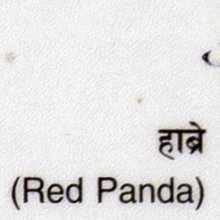Panda, Pāṇḍā, Paṇḍa, Pāṇḍa, Paṇḍā, Pamda, Pānḍā: 20 definitions
Introduction:
Panda means something in Hinduism, Sanskrit, Buddhism, Pali, the history of ancient India, Marathi, Jainism, Prakrit, Hindi, biology. If you want to know the exact meaning, history, etymology or English translation of this term then check out the descriptions on this page. Add your comment or reference to a book if you want to contribute to this summary article.
Images (photo gallery)
In Hinduism
Vaishnavism (Vaishava dharma)
Source: ISKCON Press: GlossaryPāṇḍā (पाण्डा).—A brahmāṇa guide at temples and holy places; see also: Paṇḍita.

Vaishnava (वैष्णव, vaiṣṇava) or vaishnavism (vaiṣṇavism) represents a tradition of Hinduism worshipping Vishnu as the supreme Lord. Similar to the Shaktism and Shaivism traditions, Vaishnavism also developed as an individual movement, famous for its exposition of the dashavatara (‘ten avatars of Vishnu’).
Purana and Itihasa (epic history)
Source: archive.org: Puranic EncyclopediaPāṇḍa (पाण्ड).—One of the sons born to Kaṇva of his wife Āryavatī. He married Sarasvatīputrī and begot seventeen sons. They all became in the future originators of races. (Pratisargasaṃhitā, Bhaviṣya Purāṇa).
Source: Cologne Digital Sanskrit Dictionaries: The Purana IndexPāṇḍa (पाण्ड).—Of the Bhārgavagotra.*
- * Vāyu-purāṇa 65. 96.

The Purana (पुराण, purāṇas) refers to Sanskrit literature preserving ancient India’s vast cultural history, including historical legends, religious ceremonies, various arts and sciences. The eighteen mahapuranas total over 400,000 shlokas (metrical couplets) and date to at least several centuries BCE.
India history and geography
Source: Cologne Digital Sanskrit Dictionaries: Indian Epigraphical GlossaryPāṇḍā.—(EI 32), a temple superintendent; same as Vārika. Note: pāṇḍā is defined in the “Indian epigraphical glossary” as it can be found on ancient inscriptions commonly written in Sanskrit, Prakrit or Dravidian languages.

The history of India traces the identification of countries, villages, towns and other regions of India, as well as mythology, zoology, royal dynasties, rulers, tribes, local festivities and traditions and regional languages. Ancient India enjoyed religious freedom and encourages the path of Dharma, a concept common to Buddhism, Hinduism, and Jainism.
Biology (plants and animals)
Source: Wisdom Library: Local Names of Plants and DrugsPanda [पान्डा] in the Nepali language is the name of a plant identified with Spiraea arcuata Hook.f. from the Rosaceae (Rose) family having the following synonyms: Spiraea canescens var. glabra. For the possible medicinal usage of panda, you can check this page for potential sources and references, although be aware that any some or none of the side-effects may not be mentioned here, wether they be harmful or beneficial to health.
Source: Google Books: CRC World Dictionary (Regional names)Panda in Cameroon is the name of a plant defined with Panda oleosa in various botanical sources. This page contains potential references in Ayurveda, modern medicine, and other folk traditions or local practices It has the synonym Porphyranthus zenkeri Engl..
Example references for further research on medicinal uses or toxicity (see latin names for full list):
· Bulletin Mensuel de la Société Linnéenne de Paris
· Botanische Jahrbücher für Systematik, Pflanzenge schichte und Pflanzengeographie (1899)
If you are looking for specific details regarding Panda, for example chemical composition, extract dosage, diet and recipes, pregnancy safety, side effects, health benefits, have a look at these references.

This sections includes definitions from the five kingdoms of living things: Animals, Plants, Fungi, Protists and Monera. It will include both the official binomial nomenclature (scientific names usually in Latin) as well as regional spellings and variants.
Languages of India and abroad
Pali-English dictionary
Source: Sutta: The Pali Text Society's Pali-English DictionaryPaṇḍa, see bhaṇḍati. (Page 404)

Pali is the language of the Tipiṭaka, which is the sacred canon of Theravāda Buddhism and contains much of the Buddha’s speech. Closeley related to Sanskrit, both languages are used interchangeably between religions.
Marathi-English dictionary
Source: DDSA: The Molesworth Marathi and English Dictionarypāṇḍa (पांड).—m A land measure,--the twentieth part of a bighā, or twenty square kāṭhyā or rods. 2 N. D. A plot or parcel of ground (field or garden).
--- OR ---
pāṇḍā (पांडा).—m (paṇḍita S through H) A title of Hindustani Brahmans. See under pāṇḍyā.
--- OR ---
pāṇḍā (पांडा).—m (Esp. with vāghācā preceding.) A tiger's cub, esp. as half-grown.
--- OR ---
pānda (पांद).—f A lane through a village or between fields or enclosures.
Source: DDSA: The Aryabhusan school dictionary, Marathi-Englishpāṇḍa (पांड).—m A land measure-the twentieth part of a bighā or twenty square kāṭhyā or rods.
--- OR ---
pāṇḍā (पांडा).—m A title of Hindustani Brah- mans. See under pāṇḍyā, m A tiger's cub, esp. as half-grown.
Marathi is an Indo-European language having over 70 million native speakers people in (predominantly) Maharashtra India. Marathi, like many other Indo-Aryan languages, evolved from early forms of Prakrit, which itself is a subset of Sanskrit, one of the most ancient languages of the world.
Sanskrit dictionary
Source: DDSA: The practical Sanskrit-English dictionaryPaṇḍa (पण्ड).—A eunuch; weakling.
Derivable forms: paṇḍaḥ (पण्डः).
--- OR ---
Paṇḍā (पण्डा).—
1) Wisdom, understanding.
2) Learning, science.
Source: Cologne Digital Sanskrit Dictionaries: Shabda-Sagara Sanskrit-English DictionaryPaṇḍa (पण्ड).—mn.
(-ṇḍaḥ-ṇḍaṃ) 1. A catamite. 2. An eunuch. f.
(-ṇḍā) 1. Wisdom, understanding. 2. Science, learning. E. paḍi to go, aff. ac or paṇ to deal, Unadi aff. ḍa, tasya netvam; also with kan added paṇḍaka.
Source: Cologne Digital Sanskrit Dictionaries: Cappeller Sanskrit-English DictionaryPaṇḍa (पण्ड).—[masculine] eunuch, weakling.
Source: Cologne Digital Sanskrit Dictionaries: Monier-Williams Sanskrit-English Dictionary1) Paṇḍa (पण्ड):—[from paṇḍ] m. a eunuch, weakling, [Nārada-smṛti, nāradīya-dharma-śāstra] (cf. paṇḍra, ṣaṇḍa)
2) Paṇḍā (पण्डा):—[from paṇḍa > paṇḍ] a f. See below.
3) [from paṇḍ] b f. wisdom, knowledge, learning, [cf. Lexicographers, esp. such as amarasiṃha, halāyudha, hemacandra, etc.] (cf. [gana] tārakādi).
4) Pāṇḍa (पाण्ड):—m. (f(ī). ) [gana] gaurādi
5) [wrong reading] for pāṇḍya and pāṇḍu.
Source: Cologne Digital Sanskrit Dictionaries: Yates Sanskrit-English DictionaryPaṇḍa (पण्ड):—[(ṇḍaḥ-ṇḍaṃ)] 1. m. n. A catamite; a eunuch. f. (ṇḍā) Wisdom; science.
Source: DDSA: Paia-sadda-mahannavo; a comprehensive Prakrit Hindi dictionary (S)Paṇḍa (पण्ड) in the Sanskrit language is related to the Prakrit words: Paṃḍa, Paṃḍaga, Paṃḍaya, Paṃḍu.
[Sanskrit to German]
Sanskrit, also spelled संस्कृतम् (saṃskṛtam), is an ancient language of India commonly seen as the grandmother of the Indo-European language family (even English!). Closely allied with Prakrit and Pali, Sanskrit is more exhaustive in both grammar and terms and has the most extensive collection of literature in the world, greatly surpassing its sister-languages Greek and Latin.
Hindi dictionary
Source: DDSA: A practical Hindi-English dictionaryPanda in Hindi refers in English to:—(nm) a Hindu: priest helping devout pilgrims in the performance of religious rites on holy river banks; ~[giri] the function or profession of a [pamda]..—panda (पंडा) is alternatively transliterated as Paṃḍā.
...
Prakrit-English dictionary
Source: DDSA: Paia-sadda-mahannavo; a comprehensive Prakrit Hindi dictionary1) Paṃḍa (पंड) in the Prakrit language is related to the Sanskrit word: Pāṇḍya.
2) Paṃḍa (पंड) also relates to the Sanskrit word: Paṇḍa.
2) Paṃḍa has the following synonyms: Paṃḍaga, Paṃḍaya.
Prakrit is an ancient language closely associated with both Pali and Sanskrit. Jain literature is often composed in this language or sub-dialects, such as the Agamas and their commentaries which are written in Ardhamagadhi and Maharashtri Prakrit. The earliest extant texts can be dated to as early as the 4th century BCE although core portions might be older.
Kannada-English dictionary
Source: Alar: Kannada-English corpusPaṃḍa (ಪಂಡ):—[noun] a man lacking normal functions of the testes.
--- OR ---
Paṃḍa (ಪಂಡ):—[noun] a priest who conducts rituals in a pilgrim centres (in North India).
--- OR ---
Paṃda (ಪಂದ):—[noun] = ಪಂತ [pamta]1.
Kannada is a Dravidian language (as opposed to the Indo-European language family) mainly spoken in the southwestern region of India.
See also (Relevant definitions)
Starts with (+160): Pamda-eshana, Pamdalidu, Pamdalige, Pamdalir, Pamdalisu, Pamdane, Pamdar, Pamdaraga, Pamdarikku, Pamdarisu, Pamdaru, Pamdavaraharive, Pamdavarajanna, Pamdavaramaddu, Pamdaya, Pamdaya, Panda oleosa, Panda sajo, Panda tree, Pandaachodhara.
Ends with (+36): Akshispamda, Anishpanda, Anushpanda, Apakshmaspamda, Aspanda, Avaspamda, Bepanda, Bippamda, Blumea repanda, Cissus repanda, Cupanda, Emdepanda, Gonishpanda, Havishpanda, Hundapanda, Ipanda, Kakpanda, Karaspanda, Kupamda, Lesara-panda.
Full-text (+104): Pandapurva, Pamdaya, Pandra, Pandaga, Pandraka, Bigha, Pandaka, Vatapanda, Kudathalabigha, Pandarajayashobhushana, Pandavat, Tipandi, Nishpandataribhu, Pandya, Ovanda, Iyoku, Uvando, Muvamba, Ewawa, Upando.
Relevant text
Search found 24 books and stories containing Panda, Pāṇḍā, Paṇḍa, Pāṇḍa, Pānda, Paṇḍā, Pamda, Paṃḍa, Paṃda, Pānḍā; (plurals include: Pandas, Pāṇḍās, Paṇḍas, Pāṇḍas, Pāndas, Paṇḍās, Pamdas, Paṃḍas, Paṃdas, Pānḍās). You can also click to the full overview containing English textual excerpts. Below are direct links for the most relevant articles:
Chaitanya Bhagavata (by Bhumipati Dāsa)
Verse 3.10.110 < [Chapter 10 - The Glories of Śrī Puṇḍarīka Vidyānidhi]
Verse 1.17.66 < [Chapter 17 - The Lord’s Travel to Gayā]
Verse 1.17.72 < [Chapter 17 - The Lord’s Travel to Gayā]
Sahitya-kaumudi by Baladeva Vidyabhushana (by Gaurapada Dāsa)
Text 10.149 < [Chapter 10 - Ornaments of Meaning]
Brihad Bhagavatamrita (commentary) (by Śrī Śrīmad Bhaktivedānta Nārāyana Gosvāmī Mahārāja)
Verse 2.1.173 < [Chapter 1 - Vairāgya (renunciation)]
The history of Andhra country (1000 AD - 1500 AD) (by Yashoda Devi)
Part 2 - Panda (Pandabhumisvara) < [Chapter IX - The Kandravadis (A.D. 1130-1280)]
Part 11 - Panda (A.D. 1213) < [Chapter IV - The Kondapadumatis (A.D. 1100-1282)]
Part 1 - Nambaya I (A.D. 1043) < [Chapter VI - The Parichchedis (A.D. 1040-1290)]
Two Poems - Ego and Life < [January – March, 1993]
The Himalayas < [July – September, 1980]
Journey to Eternity < [January – March, 2007]
Jainism in Odisha (Orissa) (by Ashis Ranjan Sahoo)
Jaina Antiquities in Bhanapur (Cuttack) < [Chapter 3: Survey of Jaina Antiquities in Odisha]
Jaina Antiquities at Narasinghpur (Jajpur) < [Chapter 3: Survey of Jaina Antiquities in Odisha]
Jaina Temples at Subei (Koraput) < [Chapter 3: Survey of Jaina Antiquities in Odisha]


